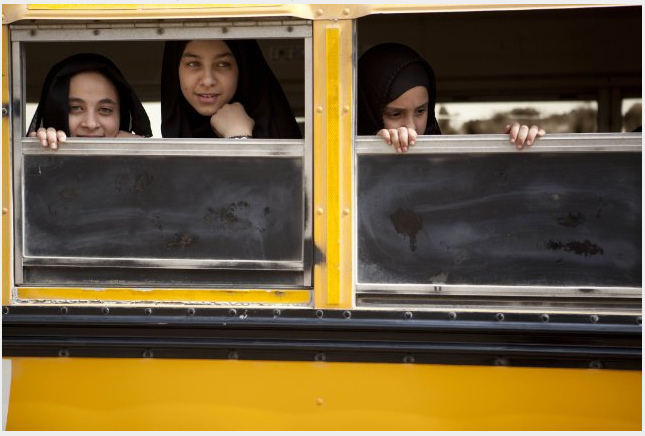On paper, Wadjda is your typical Saudi preteen girl. She also possesses more spunk and spice than the entire cast of Mean Girls combined. This may be surprising given Wadjda’s context, but viewers cannot help but feel an inner glow every time the film’s titular character out-sasses the boys.
Inspired by director Haifaa al-Mansour’s feisty niece, Wadjda’s rebellion is the driving force behind the entire film. The power of Wadjda’s precious protagonist is testament to al-Mansour’s casting ability—the other characters are familiar faces in Saudi cinema, but Waad Mohammad never acted before this film. For all her cheek, the childlike Mohammad is always endearing and never angsty.
Wadjda’s quest to get a bike seems at first like a simple storyline, but the pursuit leads the young Saudi girl into far more complex territory.
Still, Wadjda is by no means a symbol of any women’s rights movement. In fact, al-Mansour told the Voice that she has zero political intention invested in her films about Saudi women. The true themes are persistence and not giving up.
“I am not a politician, I am an artist,” al-Mansour said. Nonetheless, a political interpretation from the audience is unavoidable.
While Wadjda unquestionably represents Islamic society, simply calling it a political film would be to miss the deeper human story that al-Mansour tells about her home. She exemplifies artful sensitivity in the treatment of delicate religious topics, all while weaving in an enduring humor. The director never shows violence upfront either—the only fighting the Saudi men do is in their video games, and Wadjda’s society is curiously receptive to aspects of American pop culture despite maintaining a conservative bent.
Because of her story’s strength, al-Mansour doesn’t embellish Wadjda with fanciful music or special effects. Instead, she allows the dialogue to stand alone and uses singing of verses from the Quran as musical accompaniment amid the film’s somber soundlessness.
Although al-Mansour faced enormous limitations in creating the first film entirely shot in Saudi Arabia, she still captures the authentic setting that’s necessary to convey her story. Muted yellow buildings paired with people’s monotone outdoor dress stands in stark contrast to the vibrant colors of indoor life.
In its final moments, the triumph of persistence that transcends gender expectations shines through. This victory, executed as apolitically as possible, earned al-Mansour Saudi Arabia’s submission for the Oscars’ foreign-language category.
Wadjda wasn’t an obvious commercial pursuit or Oscar nominee, which makes its achievement even more triumphant. It may be too early to predict the growth of women’s filmmaking in Saudi Arabia, but al-Mansour hopes that her example will help make it easier.
“I watched a lot of film when I grew up. I gained so much knowledge from the way images tell stories. It’s the way I escape from reality. I wanted to find a voice and have fun with it,” al-Mansour said.
“Before, it was hard to make films. Now the possibilities are increasing. It’s a good time to be a filmmaker in Saudi.”






